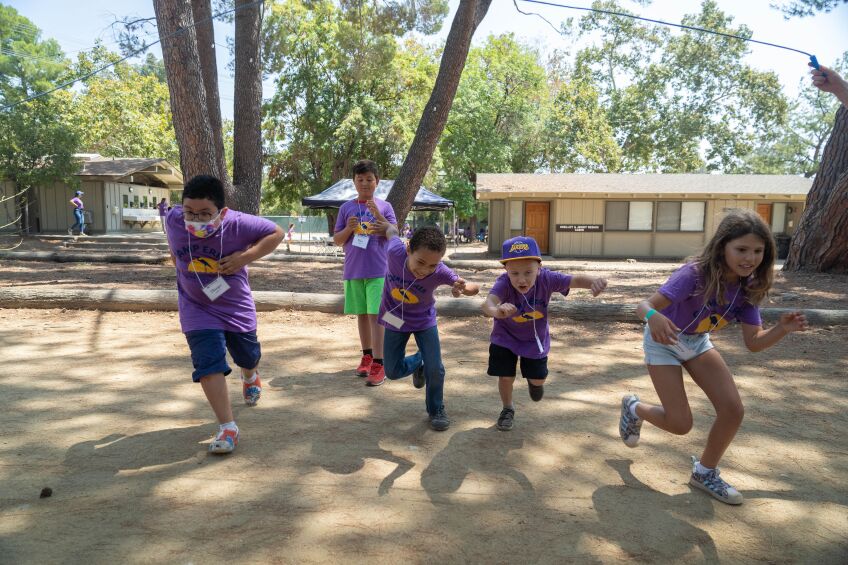Grief Camp Offers Resources for Young Children Who Lost a Parent

Explaining grief, death and mortality to young children can be extremely difficult. The nonprofit Our House provides grief counseling and resources in English and Spanish to families and children in the L.A. area. Twice a year, they host a camp for grieving children and widows.
Here are 10 things Our House counselors want parents to know about children and grief:

On a sweltering August day in campgrounds in Glendale, California, about a dozen 12-year-olds wearing protective goggles and holding glass plates in their hands gather.
One kid wearing a red "Angry Birds" t-shirt steps up and aims his plate at the wall. His peers stand behind him. "I want to release anger at my school friends … for not getting it." He takes a step forward and launches the plate forward. It smashes against the wall and shatters as his friends clap and scream behind him.
This is Camp Erin — a grief camp for children who have lost a parent. The camp began 20 years ago in Los Angeles, hosted by the nonprofit Our House and funded by The Eluna Network.
Kids ages 5 to 18 come to camp for a weekend. They are divided into groups based on age and participate in activities meant to help them in their grieving process, including plate-smashing to release anger, music and dance therapy and letter-writing to the parent they lost.








"Camp Erin is the best part of what we do … it's just something that brings a lot of light and meaning to our work," said Lauren Schneider, the clinical director of the child and adolescent program at Our House.
Schneider said that the need for grief services has skyrocketed since the pandemic. Around the United States, nearly 8 million kids lost a parent or primary caregiver due to COVID-19. The pandemic also changed the way children and families grieve, said Talya Schlesinger, the director of Camp Erin Los Angeles.
"People were dying alone. People weren't able to communicate with their loved ones or parents before and after the death … now we're hearing these stories from kids in droves,"Schlesinger said.
This was the first year that Our House also invited parents to attend Camp Erin. Grieving widows could partake in a camp up the hill from the children's camp. Parents sat in a circle on chairs in the dirt and shared stories about their young children's questions about death and how they cope. A translator was present to help facilitate.

"Having a separate parent camp was great. The work for the children is only as impactful as the family and home environment … so giving tools to guardians feels even more rewarding and important," said Schlesinger.
One of those parents was Steven Orrit. Orrit lost his wife, Jenna, to a rare form of breast cancer in 2020.
"One of the biggest struggles for me has been straddling the two worlds of being her caretaker and husband and now being a single dad to two young kids," Orrit said. "The hardest part of that early period right after Jenna died was learning how to have those really tough conversations with my kids." Orrit's children, Henry and Lucy, were 3 and 6 years old when their mom died. They attended the camp's summer and winter sessions.




At Camp Erin, parents learn how to have those candid conversations about death with their young children.
Schneider said that young children who lose a parent often can't fully comprehend the loss, so they end up acting out their grief through behavior — whether that's retreating inward or lashing out. At Camp Erin, volunteers are trained to notice this behavior and the activities are meant to help children get in touch with their feelings and learn new coping skills, such as talking to friends or drawing and journaling.
These are two breathing exercises that Our House recommends for children coping with grief:


Our House has had a school-based program in Los Angeles districts since 1997. The nonprofit would embed grief counselors and volunteers into schools, and students could participate in groups and counseling services anytime. Schneider said Our House is deeply rooted in 19 different districts and charters. They served as many as 800 kids at the program's height, but Schneider said the school-based program took a hit during the pandemic when staff couldn't provide services in person.
"Our school-based and children programs are down almost 70% … even though we know the need is out there, maybe more than ever. People are in desperate need of grief support, but we don't know how to make them aware we are opening our doors back up," Schneider said.
All of Our House's grief groups are available in person again this year at two locations: West L.A. and Woodland Hills. Our House's services are all available in Spanish as well as English. The nonprofit will host Camp Erin again this winter.
"The goal is that the socio-emotional skills they learn and the friends they make at Camp Erin or in their grief groups go far beyond a one-day experience and really sustain children and normalize their experience with loss as they continue to move through life," Schneider said.
If you or your child are struggling with grief, call OUR HOUSE at 310-473-1511 for more recommendations and support.


